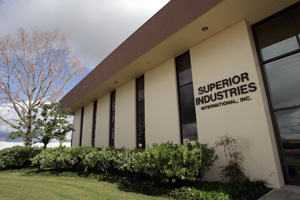
For the first time since 2004, all of Superior Industries International Inc.’s major customers – the Big Three U.S. auto makers – posted profits last year.
Sounds like it should be full speed ahead for the Van Nuys manufacturer of aluminum wheels, but not so fast.
Though Superior’s sales rose last year, its profits are on track to fall by close to 10 percent when final numbers are released next month. The blame falls mostly on deals the company made while the auto makers were struggling.
Superior and other suppliers entered contracts during the recession in which they agreed to sell parts to Detroit at bargain prices. Now the accelerating auto makers are enjoying a profit boost – partly at the suppliers’ expense. And the auto makers aren’t likely to give up those low prices.
“While it is possible in rare circumstances to renegotiate an existing contract to more favorable terms for a supplier, this is an uphill battle to say the least for a company in Superior’s position,” said Jimmy Baker, senior automotive analyst at B. Riley & Co. LLC in Los Angeles.
That’s not all. Suppliers also are spending money retooling to make parts for a parade of new models that have helped the Big Three increase sales. Superior closed three plants in the past four years and its remaining facilities are running at near full capacity, meaning even a brief shutdown to upgrade or replace equipment can delay production.
Even so, John Henke, president of Birmingham, Mich., firm Planning Perspectives Inc., which tracks auto parts suppliers, said the companies are wary of reopening plants, fearing the sales boom may only be temporary.
“Suppliers became incredibly lean and they are very reluctant to add capacity. Adding capacity means a lot of fixed costs,” he said.
Cheap wheels
Superior, which sells about 80 percent of its wheels to the U.S. auto makers, cratered during the recession. It posted a loss of $26 million in 2008, then saw that deficit more than triple to $94 million in 2009. To stem those losses, Superior closed plants in Van Nuys and Pittsburg, Kan., slashing its work force from 5,300 in 2007 to about 3,300 today.
The company returned to profitability in 2010, earning $51.6 million as U.S. auto sales picked up. Auto sales continued to improve last year, but Superior’s profits didn’t.
The company sold 8.6 million wheels in the first three quarters of last year, about 5 percent more than in the first three quarters of 2010, but profits were down 8 percent. The stock price reflected the performance, climbing throughout 2010 and into early last year, hitting a high of $26.34 in April, before falling on the weak earnings reports. It closed at $18.58 on Feb. 15.
Superior executives did not return calls for comment, saying they are in a quiet period in advance of the company’s fourth quarter earnings, scheduled to be released March 16.
Superior has not detailed how much less it is charging for products, nor has it set out how long the low-priced contracts will run. But during conference calls with investors last year, executives continually cited the deals negotiated during the recession for lagging profits.
In August, Chief Executive Steven Borick said the company gave bargain prices to auto makers in 2009. Sales from those deals didn’t ramp up until last year, but will likely continue to trim Superior’s bottom line for years.
“When we were concerned about how many more plants we were going to shut down, we took on business. If we had a transcript of those meetings, (we) would say to ourselves, ‘We’re really putting ourselves in a tough spot,’ ” he said.
Kerry Shiba, Superior’s chief financial officer, said during a call that he believes auto makers know they need to pay more if they want to keep their suppliers healthy.
Indeed, Michelle Krebs, a senior analyst with Edmunds.com, an online vehicle information company in Santa Monica, said Ford Motor Co. has started to renegotiate, giving some suppliers more money, and that General Motors Corp. and Chrysler Group LLC may follow suit.
But Henke said the big auto makers in general aren’t inclined to offer much higher prices to suppliers, many of which are smaller private companies that don’t have much bargaining power. Some auto makers will agree to pay more only if suppliers can show that factors outside of a company’s control are pushing up material or labor costs and are jeopardizing operations.
The auto makers are “just trying to hold on as long as they can” to the recession-level prices, he said.
Less for more
Meanwhile, Superior has had to absorb costs associated with making new wheels, including shutting down assembly lines to retool and the consequent higher labor costs as workers put in overtime to fill orders that had been delayed.
During the company’s third quarter conference call, Borick estimated the changing product lines cost the company as much as $5 million in profit that quarter.
Edmunds’ Krebs said parts suppliers are faced with an avalanche of retooling as the automakers emerged from the deep recession to offer many updated styles.
“When you develop products that go on these new models, there’s an up-front cost that you don’t get back for a bit,” she said.
For Superior, many of the new wheels are larger and more difficult to make than the company’s previous offerings. For instance, it no longer makes 15-inch wheels for the Ford Focus, but has started producing 16- and 18-inch wheels for other Ford models.
Borick said during a conference call that the company is “taking a very aggressive stand” in looking to add capacity.
Baker, the B. Riley analyst, agreed that the company needs to do so as competitors ramp up production, but expansion could be tricky because prices for Superior’s products are already low and adding capacity could them down lower.
